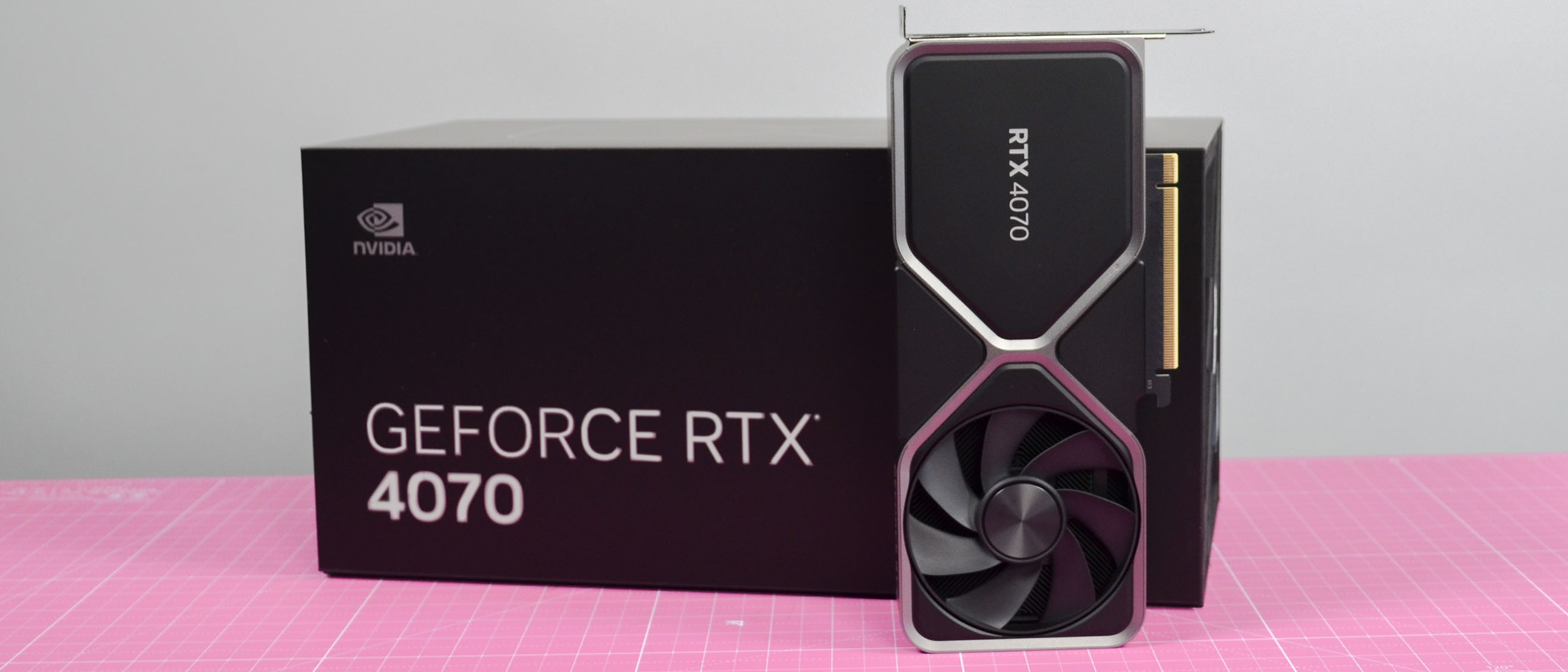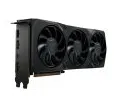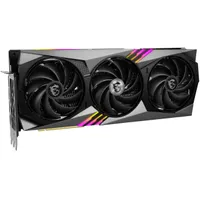TechRadar Verdict
The Nvidia GeForce RTX 4070 is arguably the perfect mix of performance, price, and advanced features that most gamers are going to want — and can actually afford — to buy. It's hard to find fault with this card other than its price, but kudos to Nvidia for keeping it under $600; it could have gone higher and we'd still have recommended it.
Pros
- +
Can handle 4K gaming with DLSS
- +
The ultimate 1440p gaming card
- +
Small enough to not need support
Cons
- -
Increase in price over RTX 3070
- -
Native 4K performance is lacking
- -
16-pin connector
Why you can trust TechRadar
Editor's Note
• Original review date: April 2023
• Launch price: MSRP at $599 / £589 / AU$1,109
• Lowest price now: $792.99 / £485.28 / AU$899
Update – April 2025: With the release of the Nvidia GeForce RTX 5070, you'd hope that it would force the price of the RTX 4070, one of the best graphics cards of the last generation, down somewhat, but that doesn't appear to be the case in the US (UK and Australian shoppers can actually find this card for less than RRP right now).
With the lowest price I've found for the RTX 4070 is in the US, coming in at just under $800, it's a much harder card to recommend in 2025, especially with AMD Radeon RX 7800 XT cards selling for much less and much more readily available online.
Original unedited review follows...

Nvidia GeForce RTX 4070: Two-minute review
The Nvidia GeForce RTX 4070 is here at long last, and for gamers who've been starved for an upgrade, go ahead and pick this one up. It can do just about everything.
It's hard to follow up the RTX 3070, one of the best graphics cards of all time, and in our Nvidia GeForce RTX 3070 review, we praised that card for being an outstanding performer at 1080p and 1440p — which is where the overwhelming number of PC gamers game at — while also being a much more affordable option over the other two launch cards for Nvidia's Ampere lineup. We especially noted how the RTX 3070 offered comparable performance to the RTX 2080 Ti for half the price.
Everything we said about the RTX 3070 applies just as easily to the RTX 4070, only now it doesn't just dabble in 4K; it can competently game at every resolution, making it a graphics card that everybody can fall in love with without spending a fortune.
Sign up for breaking news, reviews, opinion, top tech deals, and more.
A lot has changed since the RTX 3070 launched towards the end of 2020, and unfortunately, not everything changed for the better. Things are more expensive pretty much everywhere you look, and the Nvidia RTX 4070 isn't immune. At $599 (about £510 / AU$870), the RTX 4070 is fully 20% more expensive than the RTX 3070 was at launch.
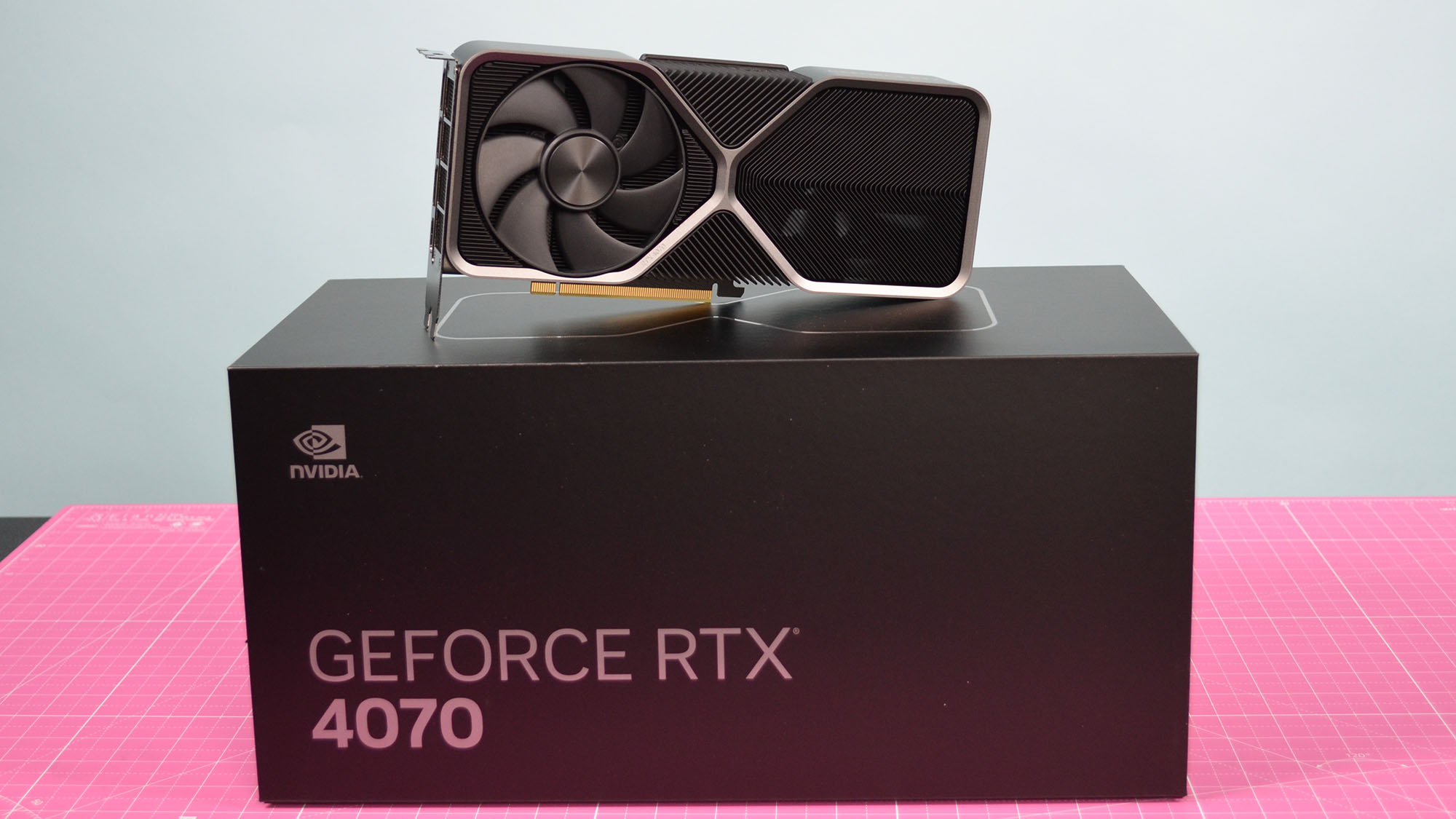
I'm not happy about this at all, and you shouldn't be either, but all you have to do is look at the scores the RTX 4070 puts up on the board and you'll be as hard pressed as I am to dock it any points for this. It consistently puts out RTX 3080-level performance more or less across the board and even manages to bloddy the nose of the Nvidia GeForce RTX 3080 Ti, and while the RTX 3080 beats out the RTX 4070 at native 4K, turn on DLSS and the RTX 3080 simply gets blown out.
On the other side of the aisle, the AMD Radeon RX 7900 XT is Team Red's nearest real competition, and it struggles to justify itself in the presence of the RTX 4070. While the RX 7900 XT solidly outperforms the 4070, it's also 50% more expensive, and the benefits of the RX 7900 XT get quickly drowned out by the power of DLSS, especially in titles with DLSS 3.
Moreover, the RTX 4070 makes for a pretty competent creator GPU, offering indie developers and artists who don't have the funding to get themselves an Nvidia GeForce RTX 4090 a handy option for getting some work done within a more limited budget. It's not going to power a major movie studio or anything, but if you're dabbling in 3D modeling or video editing, this card is great compromise between price and performance.
Finally, wrap this all into a package that feels like a downright normal graphics card from ye olden days, back before you needed to include support brackets and balast to keep your gaming PC from tipping over, and you end up with a graphics card that can easily power some of the best gaming PCs that can actually fit into your PC case and your budget.
This graphics card has its issues, which is inevitable, but given what's on offer here, it's easy enough to look past its shortcomings and enjoy some truly outstanding performance at at a reasonable enough price.
Nvidia GeForce RTX 4070 review: Price & availability
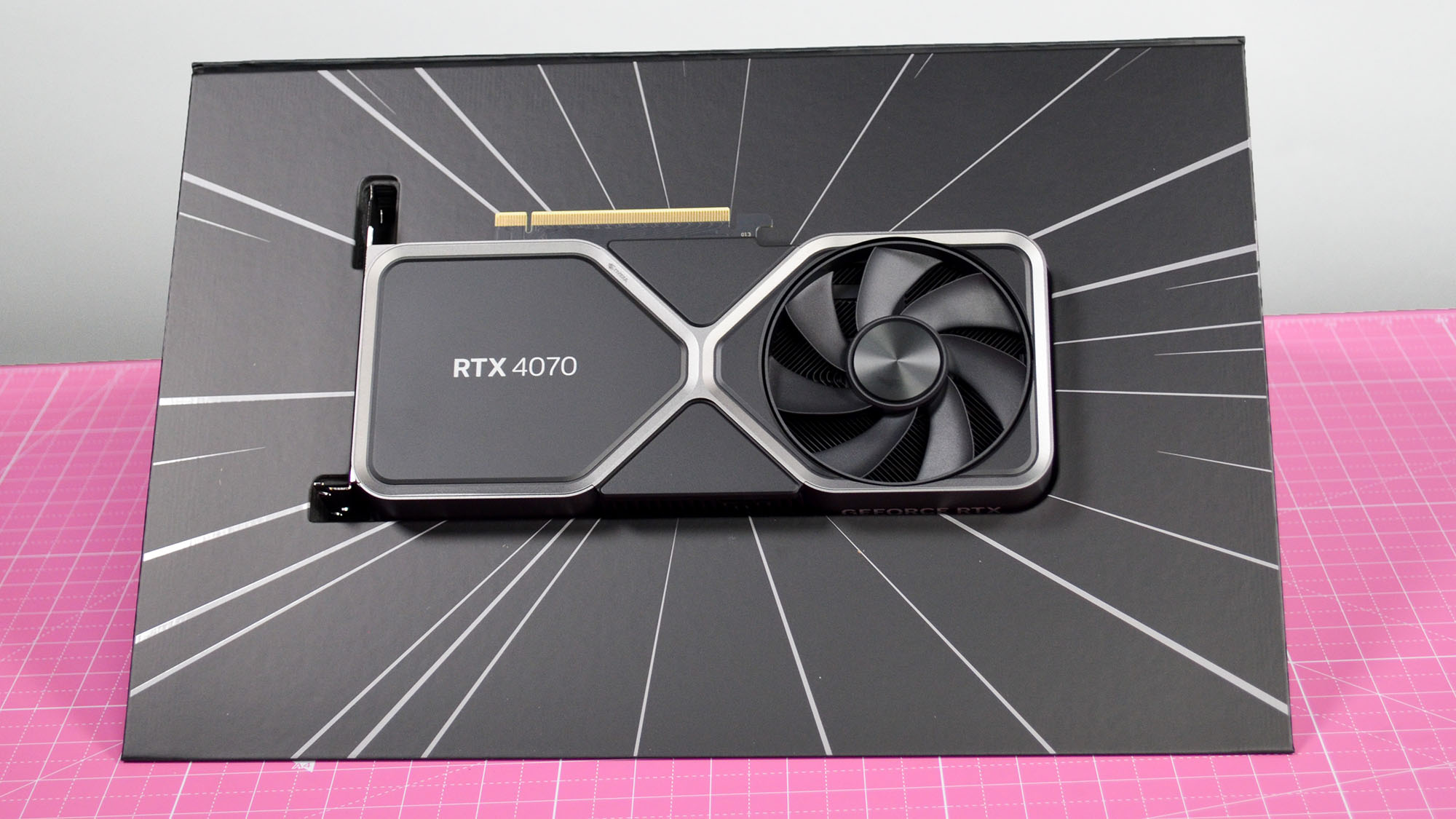
- How much is it? $599 (about £510 / AU$870)
- When is it out? April 13, 2023
- Third-party cards retail prices will match or exceed Nvidia's MSRP
The Nvidia GeForce RTX 4070 is available starting April 13, 2023, with an MSRP of $599 (about £510 / AU$870). Third-party partners will have their own versions of the RTX 4070 that will vary in price, but they will always have a matching or higher regular retail price than the Nvidia GeForce RTX 4070 Founders Edition.
Notably, the RTX 4070 is getting a 20% price increase over the card it's replacing, the RTX 3070, which had a launch price of $499 in the US (about £425 / AU$725). While we'd have loved to see the price stay the same gen-over-gen, this should come as no surprise to anyone who has been watching GPU price inflation recently.
The Nvidia GeForce RTX 4080, for example, has a ludicrously high MSRP of $1,199 (a roughly 72% jump over the RTX 3080), while the Nvidia GeForce RTX 4090 also increased its price over the Nvidia GeForce RTX 3090 to $1,599 from the 3090's $1,499.
Meanwhile, we haven't seen AMD's direct RTX 4070 competitor yet, the AMD Radeon RX 7800 XT, but the AMD Radeon RX 7900 XT is the closest AMD has this generation with an $899 / £799 (around AU$1,350) MSRP, putting it 50% more expensive than the RTX 4070.
This card is also the same price as the Nvidia GeForce RTX 3070 Ti, for what it's worth, and considering that the RTX 4070 punches well above the 3070 Ti's performance, you do at least get a better sense of value out of this card than anything from the last generation.
- Price score: 4 / 5
Nvidia GeForce RTX 4070 review: Features & chipset
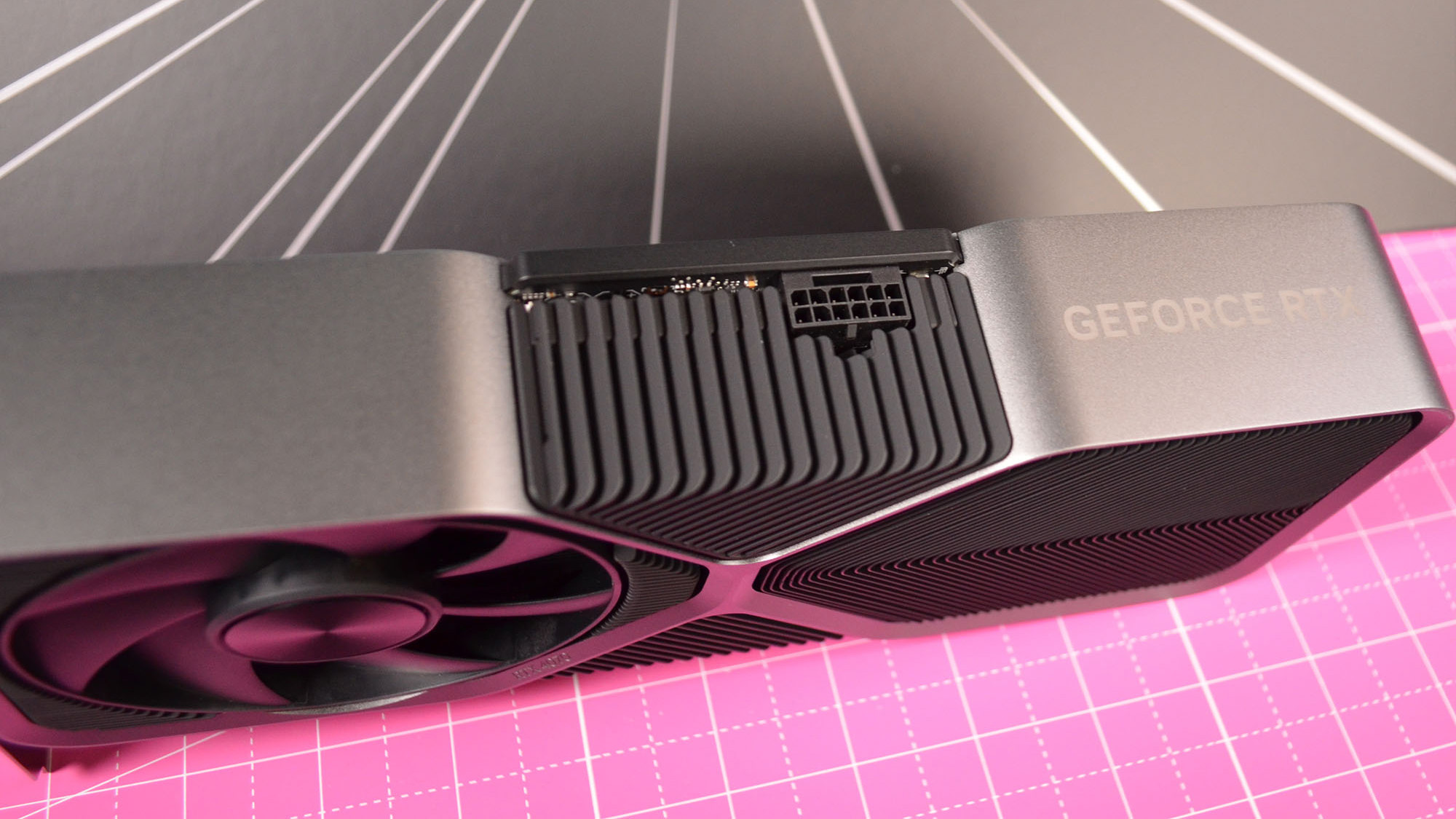
- DLSS 3 with full Frame Generation
- Third-gen Ray Tracing Cores and fourth-gen Tensor Cores
- Lower TGP than RTX 3070
Component | Nvidia RTX 4070 | Nvidia RTX 4070 Ti | Nvidia RTX 3070 |
|---|---|---|---|
Price | $599 (about £510 / AU$870) | $799 / £799 / AU$1,479 | $499 (about £425 / AU$725) |
GPU | AD104 | AD104 | GA104 |
Transistor count | 35.8 billion | 35.8 billion | 17.4 billion |
TGP | 200W | 285W | 220W |
CUDA Cores | 5,888 | 7,680 | 5,888 |
RT Cores | 46 | 60 | 46 |
Tensor Cores | 184 | 240 | 184 |
Base Clock | 1,920MHz | 2,310MHz | 1,500MHz |
Boost Clock | 2,475MHz | 2,610MHz | 1,725MHz |
VRAM | 12GB GDDR6X | 12GB GDDR6X | 8GB GDDR6 |
Memory Clock | 1,313MHz | 1,313MHz | 1,750MHz |
Bus Size | 192-bit | 192-bit | 256-bit |
Memory Bandwidth | 504.2 GB/s | 504.2 GB/s | 448.0 GB/s |
The Nvidia RTX 4070 doesn't change too much on paper over its last-gen predecessor, featuring the same number of streaming multiprocessors, therefore the same number of CUDA cores (5,888), ray-tracing cores (46), and tensor cores (184).
It does bump up its memory to the faster GDDR6X and adds an additional 50% VRAM for a total of 12GB. With a 192-bit bus and a memory clock of 1,313MHz, the RTX 4070 has an effective memory speed of 21 Gbps, equal to that of the Nvidia RTX 4070 Ti, for a memory bandwidth of 504.2 GB/s.
It has a lower base and boost frequency than the 4070 Ti, clocking in at 1,920MHz base and 2,475MHz boost (compared to 2,310MHz base and 2,610MHz boost for the 4070 Ti), but this is a substantial bump up from the 1,500MHz base and 1,725MHz boost frequency of the RTX 3070.
This is owing to the 5nm TSMC process used to fab the AD104 GPU, compared to the Samsung 8nm process for the RTX 3070's GA104. Those faster clocks also power next-gen ray tracing and tensor cores, so even though there are the same number of cores in both the RTX 4070 and the RTX 3070, the RTX 4070's are both much faster and more sophisticated.
Also factor in Nvidia Lovelace's DLSS 3 with Frame Generation capacity, something that Nvidia Ampere and Turing cards don't have access to, and what looks like two very similar cards on paper turns out to be anything but in practice.
Finally, thanks to the 5nm process, Nvidia is able to squeeze more performance out of less power, so the TGP for the RTX 4070 is just 200W, making it a fantastic card for a lower-power, sub-600W build.
- Features & chipset: 5 / 5
Nvidia GeForce RTX 4070 review: Design
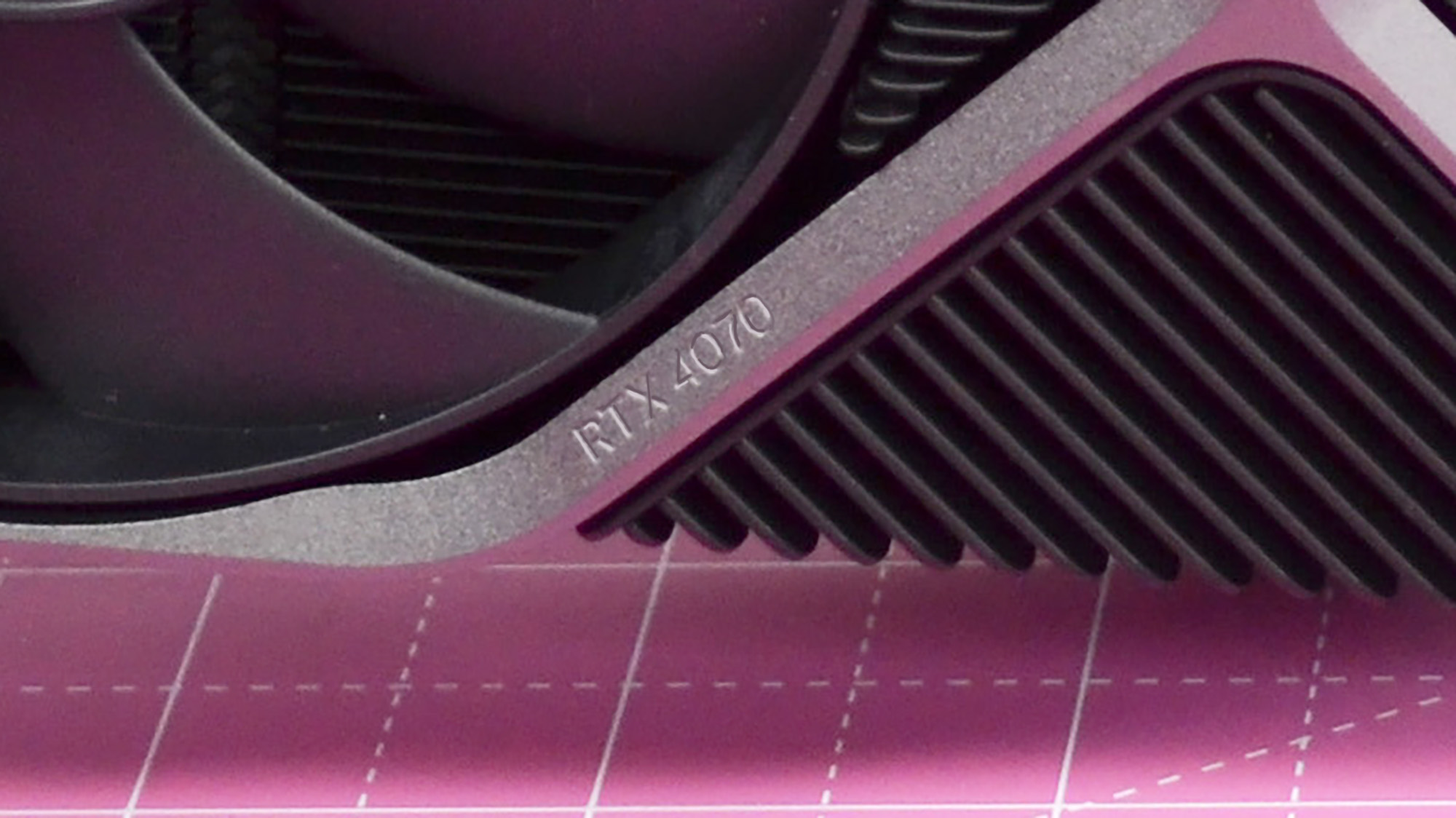
- Same size as the RTX 3070
- 16-pin power connector
- Same design as RTX 4090 and RTX 4080
| Header Cell - Column 0 | Nvidia RTX 4070 | Nvidia RTX 3070 | Nvidia RTX 4080 |
|---|---|---|---|
Slots | Dual-slot | Dual-slot | Triple-slot |
Dimensions (L x W x H) | 9.5 x 4.4 x 1.5 ins | 242 x 112 x 38 mm | 9.5 x 4.4 x 1.4 ins | 242 x 112 x 36 mm | 12 x 5.5 x 2.5 ins | 310 x 140 x 39 mm |
Weight | 2.25 lbs | 1.02 kg | 2.25 lbs | 1.02 kg | 4.66 lbs | 2.11 kg |
Power | 1 x 16-pin | 1 x 12-pin | 1 x 16-pin |
Outputs | 3 x DisplayPort 1.4b, 1 x HDMI 2.1 | 3 x DisplayPort 1.4b, 1 x HDMI 2.1 | 3 x DisplayPort 1.4b, 1 x HDMI 2.1 |
Cooling | Twin-fan | Twin-fan | Twin-fan |
With the RTX 4070 Founders Edition, Nvidia finally delivers a next-gen graphics card that can actually fit in your case without requiring a construction winch to hold it in place.
OK, the previous cards weren't that bad, and even at the reduced form factor and weight, you'll still want to toss a GPU bracket into your case for good measure (there's no harm in protecting your investment, after all).
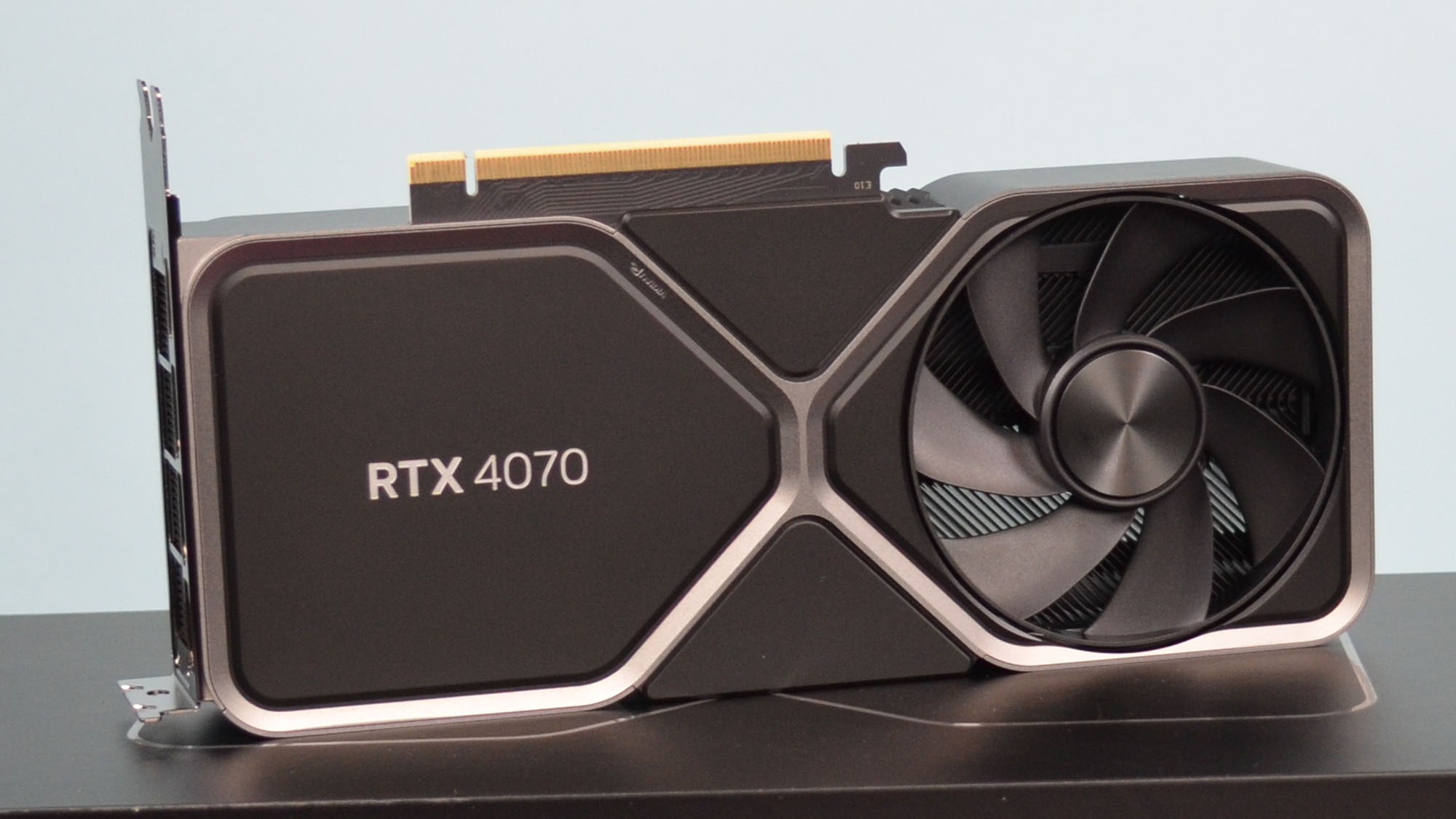
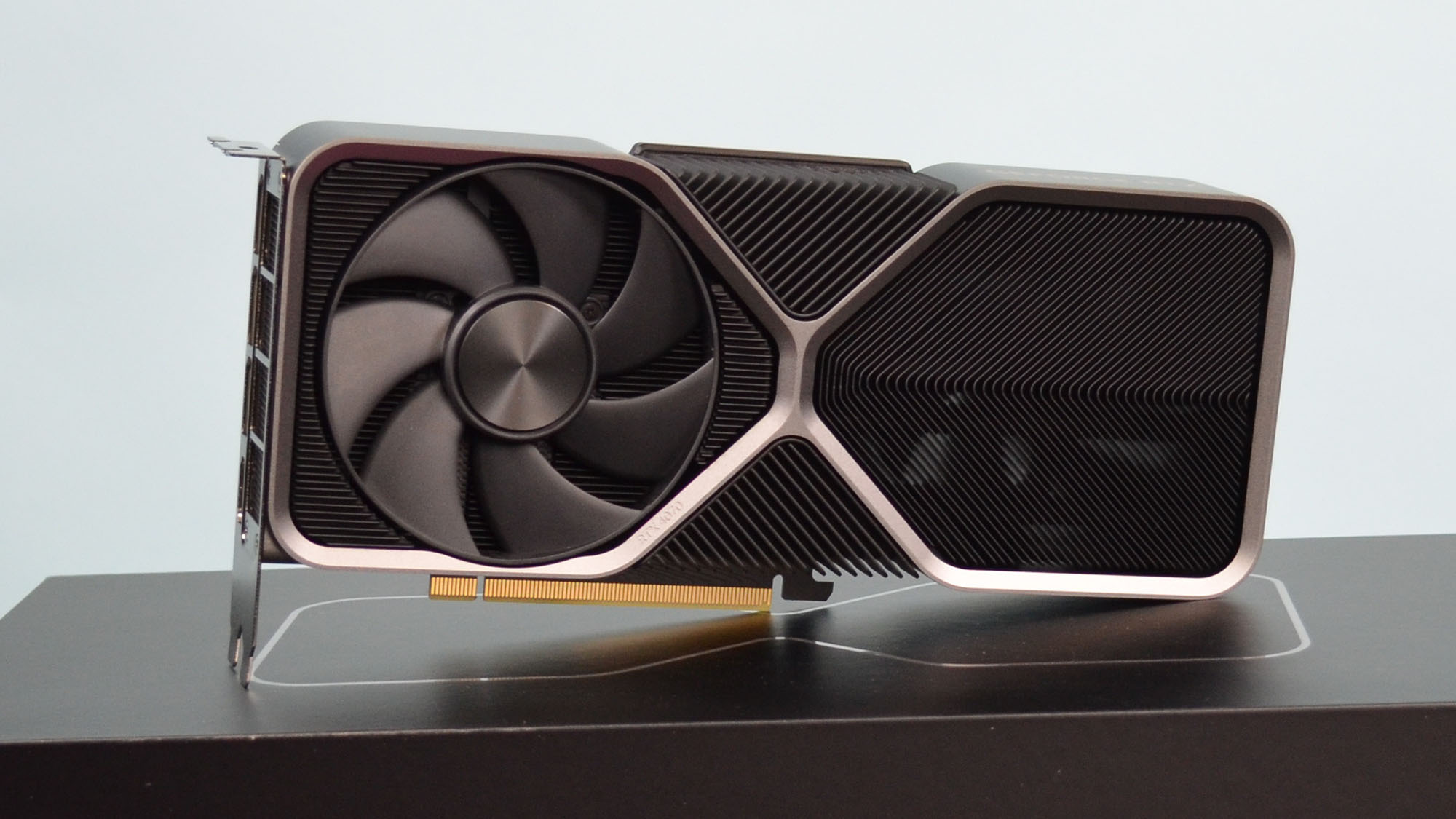
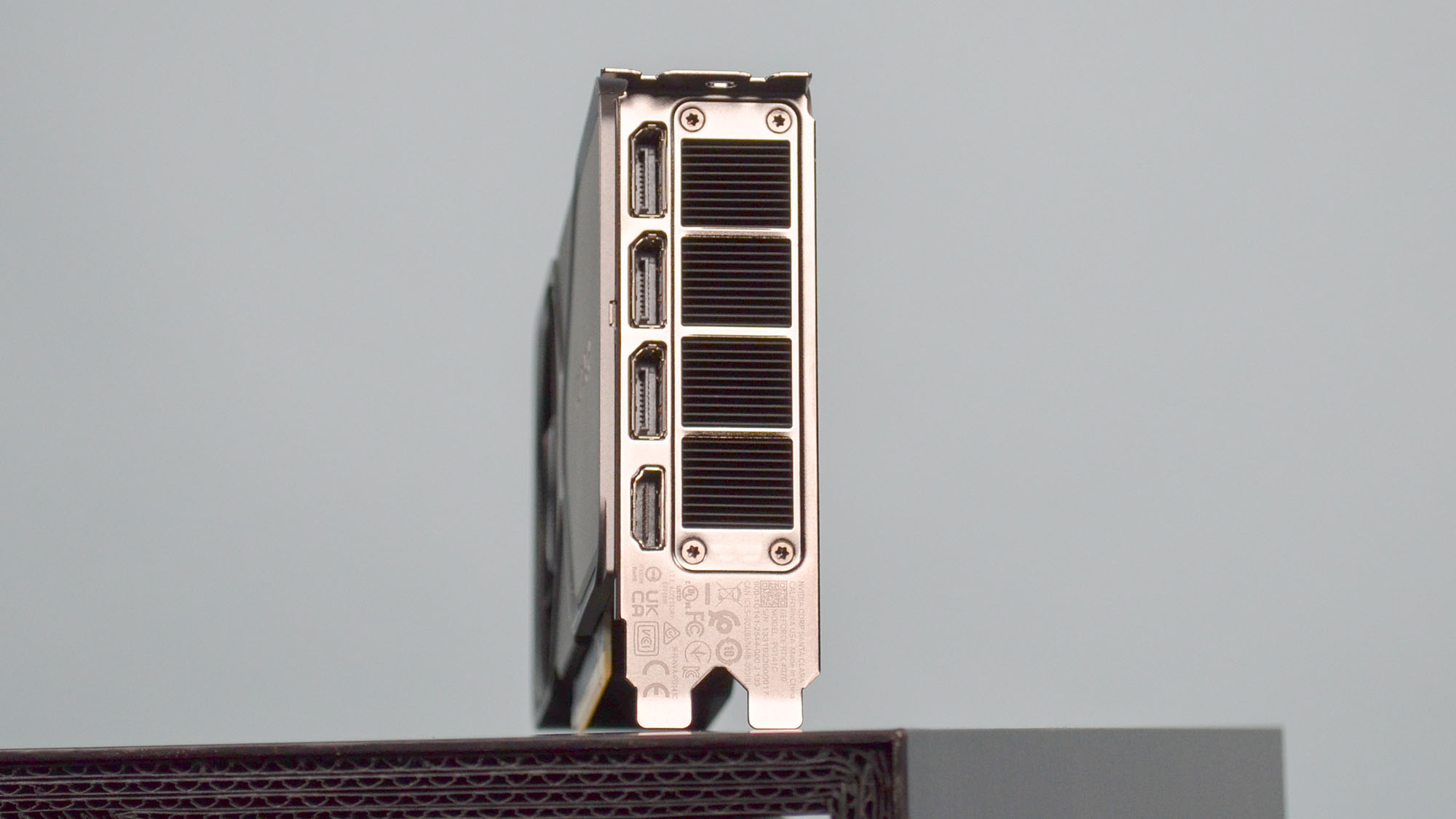
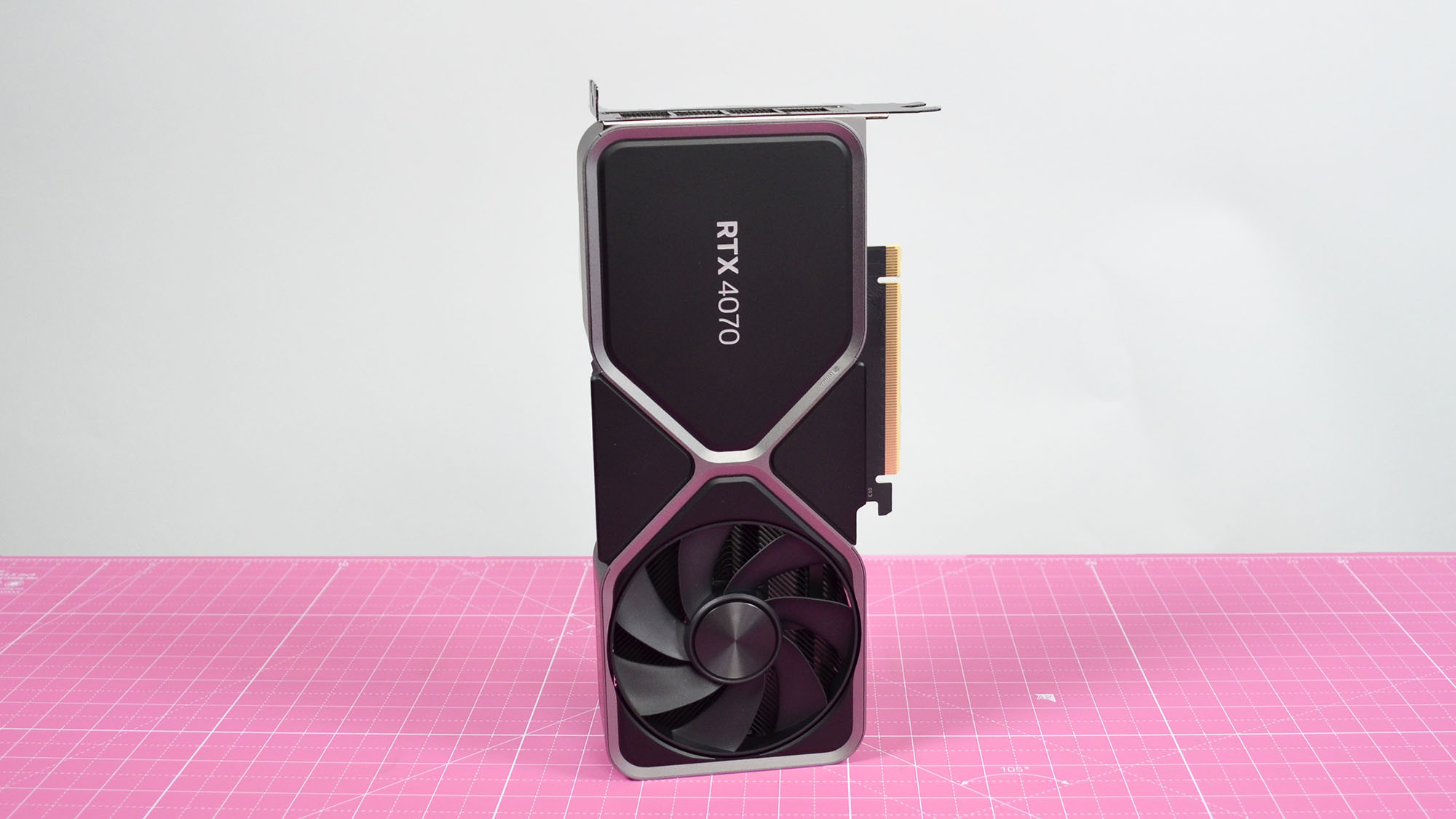
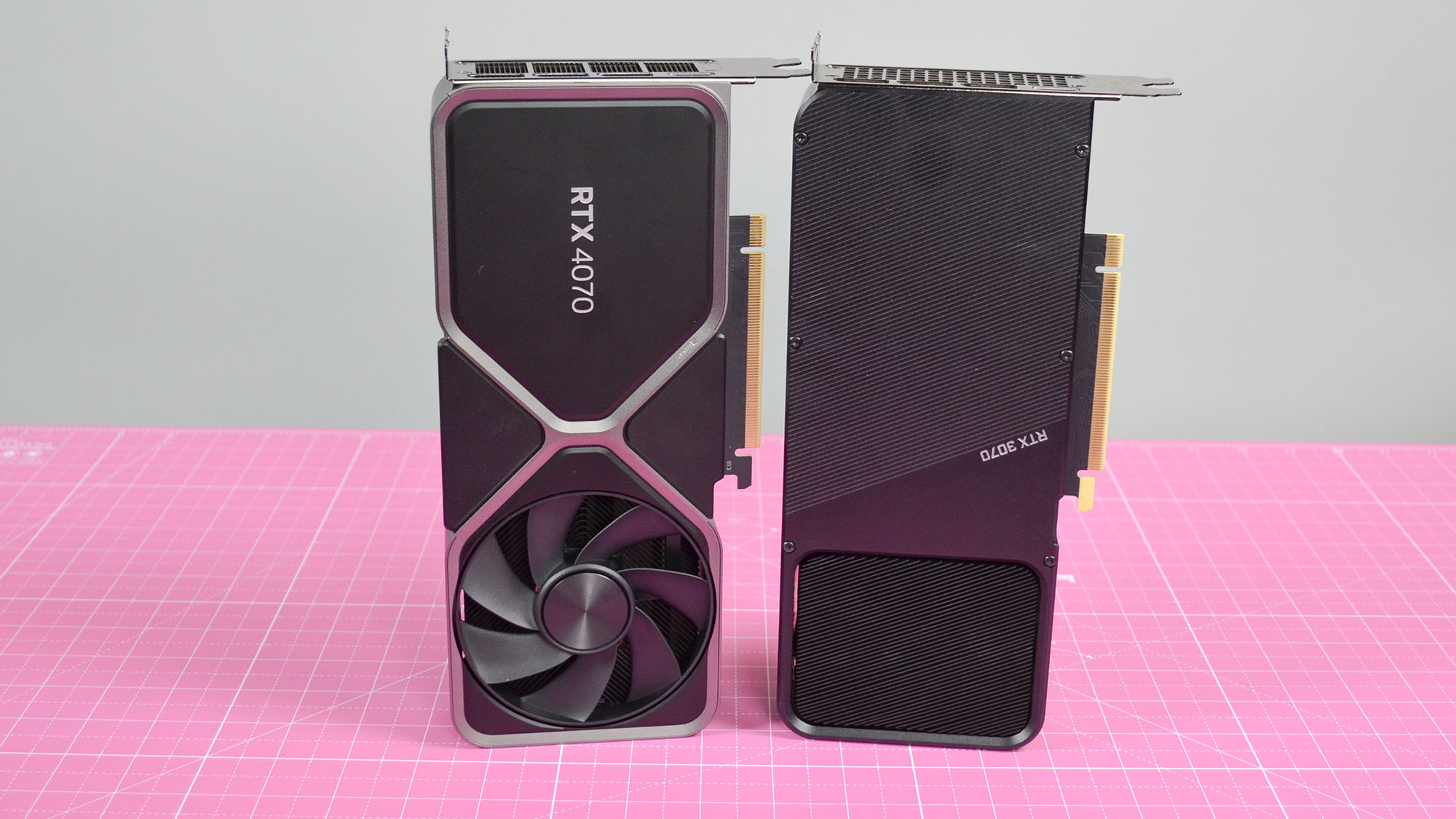
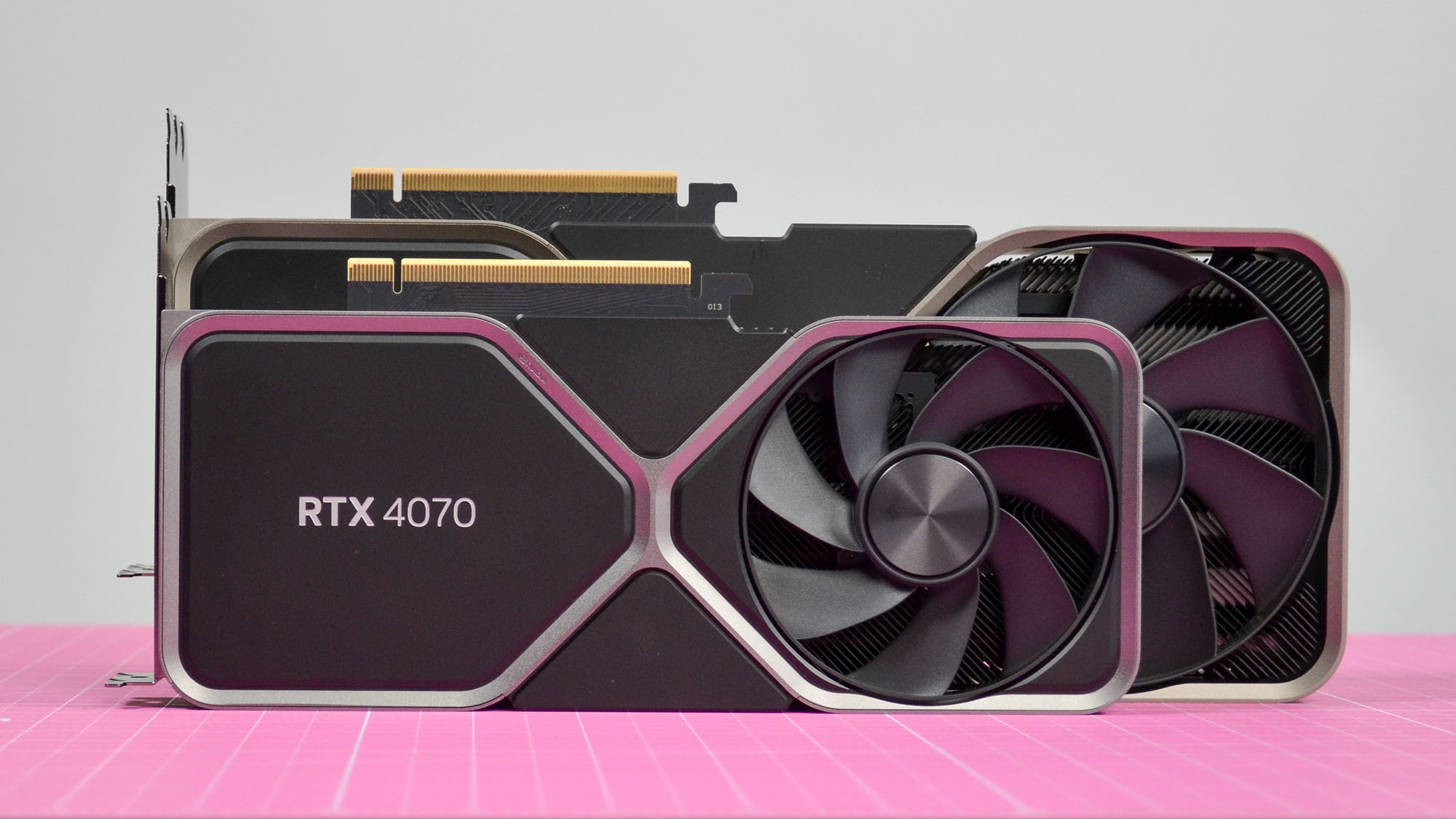
But holding the RTX 4070 in my hand, this is the first card of this generation that doesn't feel like a piece of machinery. Even the more modestly-sized AMD Radeon RX 7900 XTX and RX 7900 XT feel substantial, while the RTX 4070 feels like an old school GeForce graphics card from a couple years back.
The RTX 4070 Founders Edition keeps the same fan design as the RTX 4090 and RTX 4080 that preceeded it (a fan on the front and back), but it shrinks everything down to a dual-slot card about two-thirds the size of those monsters. The RTX 4070 also features the same outputs as previous RTX Lovelace cards (so no USB-C out), and a 16-pin power connector with an included adapter for two 8-pin leads to power the card.
With a TGP of 200W, Nvidia could theoretically have just gone with a single 8-pin connector, but Team Green seems absolutely committed to the 12VHPWR cable, it seems. I'll never stop complaining about this, but it is what it is. If you have an ATX 3.0 power supply, you won't need to worry about that, but the rest of us will have to deal with additional cable management.
- Design score: 4.5 / 5
Nvidia GeForce RTX 4070 review: Performance
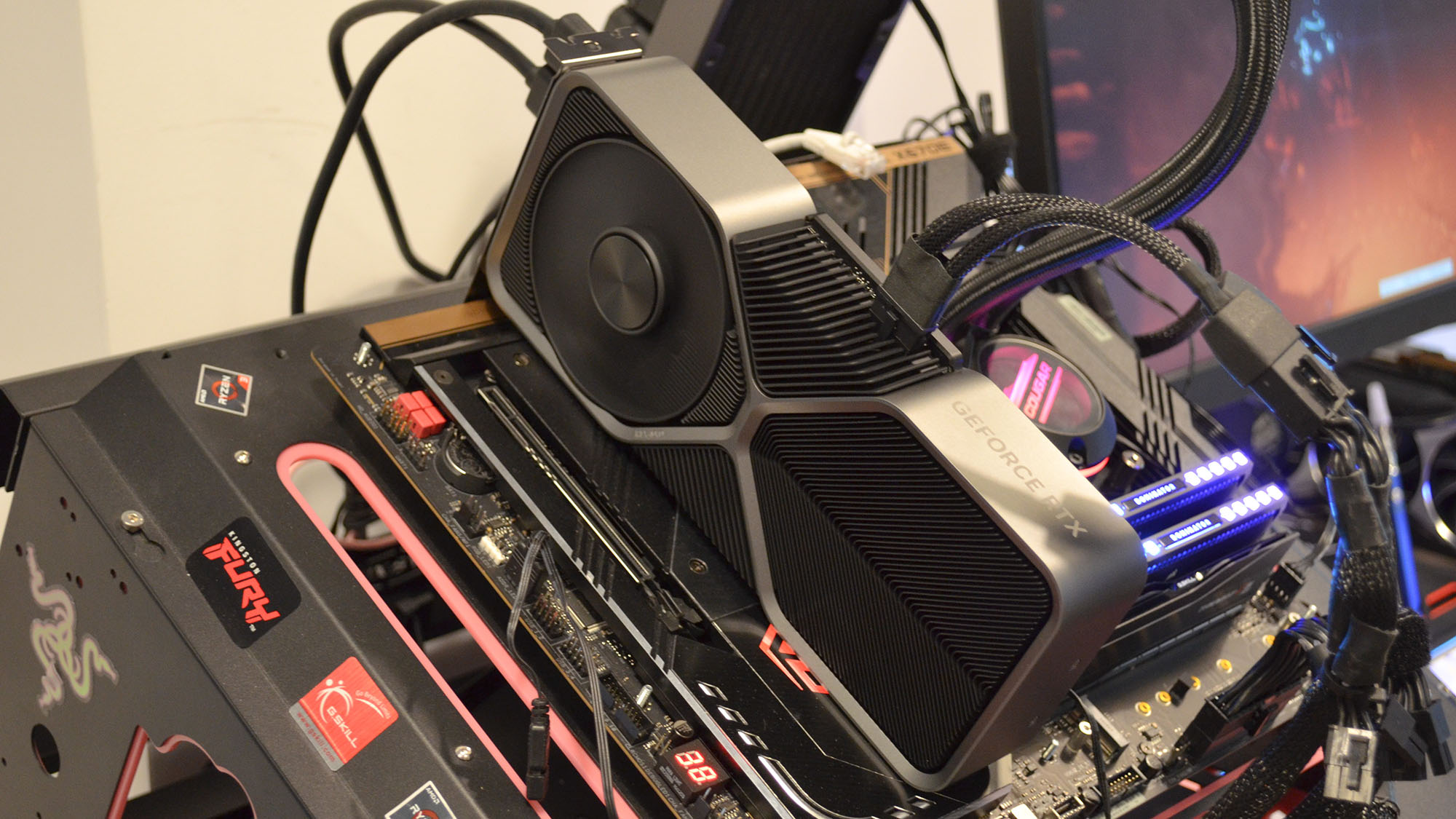
- Phenomenal gaming performance
- Can easily push 60 fps in 4K gaming with DLSS
- RTX 3080 performance at 60% of the power
Right out the gate, let's just say that the Nvidia RTX 4070 is the best 1440p graphics card on the market right now, and it's likely to remain at the top of that list for a good long while.
Its performance prowess isn't limited to just 1440p, mind you, and when I get into the gaming performance, you'll see that its 4K gaming potential is exciting (with caveats), but for starters, we can dig into its synthetic performance in tests like 3DMark to see how the fundamentals stack up.
General Performance
| Header Cell - Column 0 | 3DMark Firestrike | 3DMark Nightraid | 3DMark Speedway |
|---|---|---|---|
RTX 4070 Ti | 54,882 | 184,183 | 5,457 |
RX 7900 XT | 67,645 | 211,916 | 5,182 |
RTX 3080 Ti | 48,057 | 178,883 | 5,249 |
RTX 3080 | 44,619 | 179,024 | 4,594 |
RTX 4070 | 44,288 | 179,557 | 4,454 |
RTX 3070 Ti | 37,217 | 163,120 | 3,728 |
RTX 3070 | 34,696 | 154,177 | 3,409 |
| Header Cell - Column 0 | 3DMark Port Royal | 3DMark Time Spy | 3DMark Firestrike Extreme |
|---|---|---|---|
RTX 4070 Ti | 14,256 | 23,018 | 27,223 |
RX 7900 XT | 14,047 | 26,260 | 34,356 |
RTX 3080 Ti | 12,927 | 19,215 | 23,576 |
RTX 3080 | 11,583 | 17,638 | 21,659 |
RTX 4070 | 11,154 | 17,778 | 21,482 |
RTX 3070 Ti | 8,754 | 14,687 | 18,308 |
RTX 3070 | 8,269 | 13,496 | 16,844 |
| Header Cell - Column 0 | 3DMark Time Spy Extreme | 3DMark Firestrike Ultra | 3DMark Wildlife Extreme |
|---|---|---|---|
RTX 4070 Ti | 11,091 | 13,568 | 46,251 |
RX 7900 XT | 12,811 | 17,370 | 45,772 |
RTX 3080 Ti | 23,576 | 9,789 | 12,148 |
RTX 3080 | 8,780 | 11,005 | 38,073 |
RTX 4070 | 8,541 | 10,037 | 36,008 |
RTX 3070 Ti | 7,254 | 9,286 | 31,230 |
RTX 3070 | 6,632 | 8,605 | 28,322 |
| Header Cell - Column 0 | 3DMark Wildlife Extreme Unlimited | Passmark 3D DirectX | Average Performance |
|---|---|---|---|
RTX 4070 Ti | 45,991 | 40,610 | 42,411 |
RX 7900 XT | 47,500 | 33,328 | 46,926 |
RTX 3080 Ti | 41,027 | 36,628 | 39,057 |
RTX 3080 | 37,242 | 34,957 | 37,197 |
RTX 4070 | 35,343 | 34,913 | 36,687 |
RTX 3070 Ti | 31,117 | 31,606 | 32,391 |
RTX 3070 | 28,217 | 31,063 | 30,339 |
As you can see, the RTX 4070 outperforms the RTX 3070 by about 21% overall, while underperforming the RTX 3080 by about 1.37%, which is close enough to effectively tie the last-gen 4K powerhouse, and underperforms the RTX 3080 Ti by about 6%. Considering that the RTX 3080 Ti's MSRP is nearly twice that of the RTX 4070, this is an astounding result.
The RTX 4070 does lag behind the RTX 4070 Ti and the RX 7900 XT by quite a bit, averaging about 22% worse performance than the RX 7900 XT and about 13.5% worse performance than the RTX 4070 Ti. These current-gen cards also have substantially better hardware, so this isn't unexpected.
Creative Performance
When it comes to creative performance, well, we have a more limited dataset to work with since Blender Benchmark 3.5.0 decided it only wanted to test half the cards I tried to run it on (including failing to run on the RTX 4070), so we'll have to come back to that one at a later date once the benchmark is updated.
In the meantime, the tests I was able to run really showcased how well the RTX 4070 can handle creative workloads. On Adobe Premiere and Adobe Photoshop, the RTX 4070 performed noticeably better than the RTX 3080 across both apps and fell in very close behind the RTX 4070 Ti for an overall second place finish.
| Header Cell - Column 0 | Adobe Premiere | Adobe Photoshop |
|---|---|---|
RTX 4070 Ti | 1,278 | 1,533 |
RX 7900 XT | 1,109 | 1,519 |
RTX 3080 Ti | 1,182 | 1,467 |
RTX 3080 | 1,163 | 1,486 |
RTX 4070 | 1,210 | 1,521 |
RTX 3070 Ti | 1,054 | 1,486 |
RTX 3070 | 1,113 | 1,486 |
In lieu of Blender's Benchmark, V-Ray 5 is a fairly good stand-in, as well as an excellent benchmark in its own right. Here, the RX 7900 XT wouldn't run, since it doesn't use CUDA or Nvidia's RTX, but we can see the RTX 4070 coming in a respectable runner up to the RTX 4070 Ti.
| Header Cell - Column 0 | CUDA | RTX |
|---|---|---|
RTX 4070 Ti | 2,351 | 3,131 |
RX 7900 XT | NA | NA |
RTX 3080 Ti | 2,082 | 2,867 |
RTX 3080 | 1,790 | 2,451 |
RTX 4070 | 1,871 | 2,629 |
RTX 3070 Ti | 1,510 | 2,017 |
RTX 3070 | 1,423 | 1,819 |
One of my recent favorite workloads, Lumion 12.5, renders an architectural design into either a short movie clip at 1080p or 4K at 60 fps, making it one of the best benchmarks for creatives to see how a graphics card handles production level workloads rather than synthetic tests.
It requires the same kind of hardware as many of the best PC games in order to light a scene, create realistic water effects, and reproduce foliage on trees, and it's the kind of real-world benchmark that tells more about the card than a simple number devoid of context.
Considering that it can take a five-second, 60 fps movie clip an hour to render at production quality, I switched things up a bit and rather than calculate frames per second, like I do with Handbrake's encoding test, I use frames per hour to give a sense of how long a movie clip you can produce if you leave the clip to render overnight (a common practice).
| Header Cell - Column 0 | 1080p, 1-star quality | 1080p, 4-star quality | 4k, 4-star quality |
|---|---|---|---|
RTX 4070 Ti | 7,796 frames/hr | 962 frames/hr | 373 frames/hr |
RX 7900 XT | 5,826 frames/hr | 772 frames/hr | 312 frames/hr |
RTX 3080 Ti | 6,689 frames/hr | 803 frames/hr | 281 frames/hr |
RTX 3080 | 6,337 frames/hr | 724 frames/hr | 179 frames/hr |
RTX 4070 | 7,176 frames/hr | 730 frames/hr | 264 frames/hr |
RTX 3070 Ti | 5,473 frames/hr | 593 frames/hr | 112 frames/hr |
RTX 3070 | 5,210 frames/hr | 555 frames/hr | 99 frames/hr |
In the case of the RTX 4070, it rendered a five-second movie clip at 60 fps at draft (1-star) quality 13% faster than the RTX 3080, about 7% faster than the RTX 3080 Ti, and nearly 23% faster than the RX 7900 XT.
It lagged behind the RTX 4070 Ti, though, by about 8%, a deficit that grew wider at 1080p production (4-star) quality, where the RTX 4070 rendered the movie 25% slower than the 4070 Ti and 6.78% slower than the RX 7900 XT.
RTX 4070 Ti | 167 frames/sec |
RX 7900 XT | 165 frames/sec |
RTX 3080 Ti | 166 frames/sec |
RTX 3080 | 164 frames/sec |
RTX 4070 | 170 frames/sec |
RTX 3070 Ti | 165 frames/sec |
RTX 3070 | 167 frames/sec |
For Handbrake, the RTX 4070 manages to pull out its first clean win on the creative side, though not by a whole lot. Still, 170 frames per second encoding from 4K to 1080p is not bad at all.
Overall then, the RTX 4070 puts in a solid creative performance, besting the RTX 3080, the RX 7900 XT, the RTX 3070 Ti, and the RTX 3070, while barely losing out to the RTX 3080 Ti.
RTX 4070 Ti | 1,939 |
RX 7900 XT | 1,393 |
RTX 3080 Ti | 1,699 |
RTX 3080 | 1,551 |
RTX 4070 | 1,587 |
RTX 3070 Ti | 1,311 |
RTX 3070 | 1,251 |
Gaming Performance
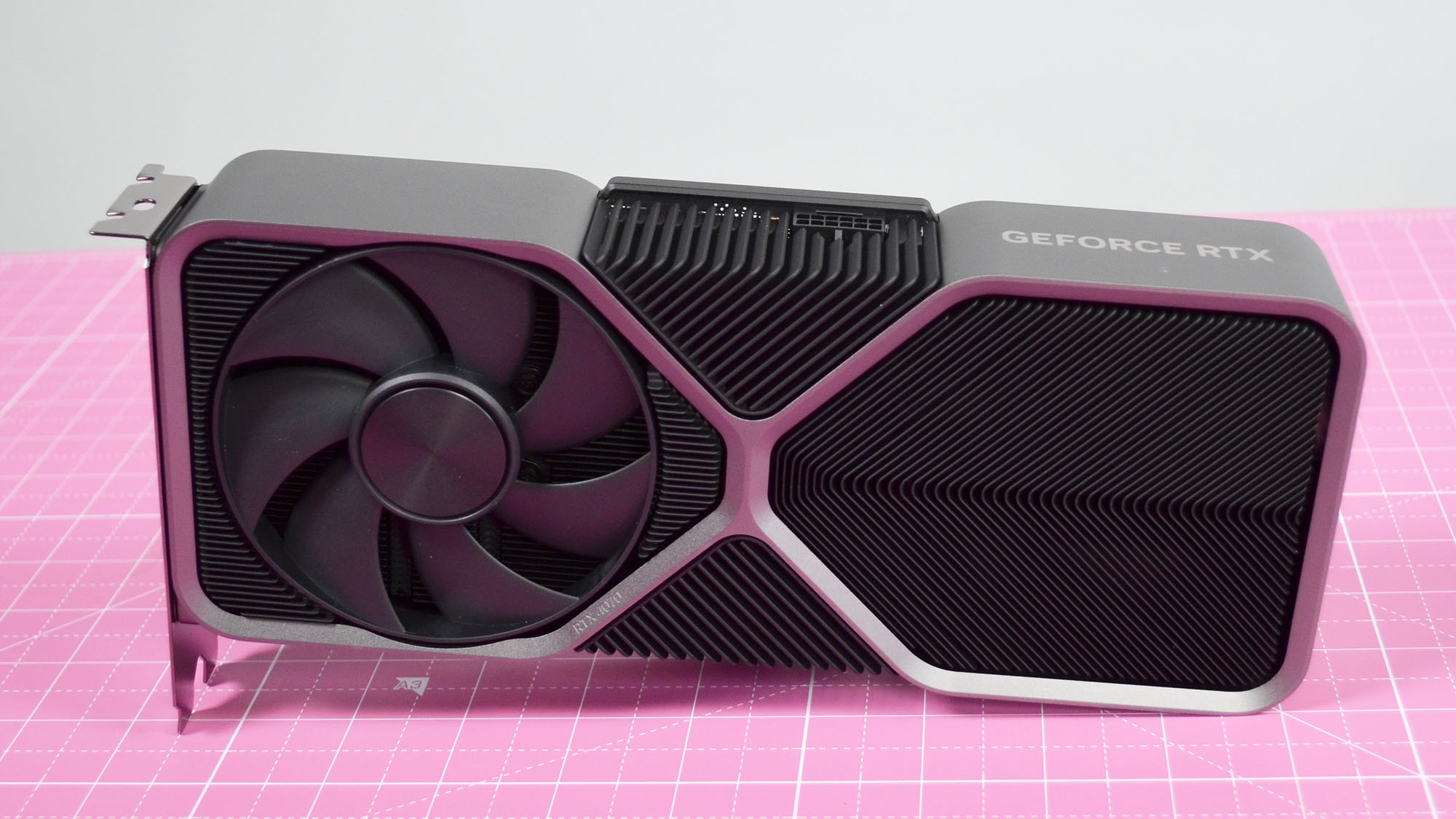
As good of a creative card as the RTX 4070 is, in its bones, this is a gamers' graphics card, so gaming performance is definitely where I spent most of my time testing the RTX 4070. I want to note that the included figures here are a representative sample of my testing, and that not all test results are shown.
| Header Cell - Column 0 | No RT, No DLSS | RT, No DLSS | RT, DLSS |
|---|---|---|---|
RTX 4070 Ti | 96 (57 min) | 76 (48 min) | 88 (54 min) |
RX 7900 XT | 99 (60 min) | 66 (46 min) | DLSS not avaliable |
RTX 3080 Ti | 80 (50 min) | 67 (43 min) | DLSS did not engage |
RTX 3080 | 79 (47 min) | 61 (40 min) | 72 (46 min) |
RTX 4070 | 77 (47 min) | 59 (38 min) | 70 (45 min) |
RTX 3070 | 62 (37 min) | 46 (30 min) | 55 (35 min) |
| Header Cell - Column 0 | No RT, No DLSS | RT, No DLSS | RT, DLSS |
|---|---|---|---|
RTX 4070 Ti | 66 (43 min) | 45 (32 min) | 53 (36 min) |
RX 7900 XT | 69 (46 min) | 36 (27 min) | DLSS not avaliable |
RTX 3080 Ti | 67 (44 min) | 22 (15 min) | 59 (40 min) |
RTX 3080 | 55 (35 min) | 35 (24 min) | 61 (40 min) |
RTX 4070 | 33 (21 min) | 17 (13 min) | 38 (26 min) |
When it comes to gaming performance, the RTX 4070 offers some of the best you're going to get at this price, though there are some stipulations to bring up right out the gate.
First, broadly speaking, this card can game at 4K on most games not called Cyberpunk 2077 or Metro: Exodus using max settings natively, so long as you keep things within reasonable limits. Or, really, one limit: keep ray tracing turned off.
| Header Cell - Column 0 | 1080p | 1440p | 2160p |
|---|---|---|---|
RTX 4070 Ti | 288 (240 min) | 241 (205 min) | 156 (130 min) |
RX 7900 XT | 321 (258 min) | 250 (203 min) | 170 (139 min) |
RTX 3080 Ti | 264 (228 min) | 247 (215 min) | 115 (88 min) |
RTX 3080 | 236 (204 min) | 198 (169 min) | 130 (110 min) |
RTX 4070 | 259 (230 min) | 204 (170 min) | 136 (116 min) |
RTX 3070 | 180 (154 min) | 143 (125 min) | 91 (79 min) |
| Header Cell - Column 0 | 1080p | 1440p | 2160p |
|---|---|---|---|
RTX 4070 Ti | 173 (159 min) | 109 (93 min) | 56 (48 min) |
RX 7900 XT | 147 (118 min) | 103 (78 min) | 55 (41 min) |
RTX 3080 Ti | 138 (120 min) | 93 (79 min) | 45 (32 min) |
RTX 3080 | 126 (109 min) | 86 (73 min) | 44 (37 min) |
RTX 4070 | 127 (108 min) | 85 (73 min) | 48 (40 min) |
RTX 3070 | 91 (78 min) | 60 (51 min) | 30 (25 min) |
Overall, the RTX 4070 gets about 58 fps on average at 4K when not ray tracing, with a floor of 45 fps at 4K, which is eminently playable. Turn ray tracing to the max and your get an average fps of 34 with a floor of 25, which is just better than a slideshow.
The RTX 3080 doesn't fare too much better on this metric, managing 40 fps on average with a floor of 29 fps at max settings with ray tacing turned on, while the RTX 3080 Ti averages about 36 fps and a floor of 19 fps. This does put the RTX 4070 just behind the 3080 Ti in terms of average fps and with a higher fps floor than the 3080 Ti.
If you're dead set on ray tracing, the RTX 4070 can certainly deliver, thanks to DLSS, which can bump those numbers back up to 79 fps on average with a floor of 55 fps. Compare that to the RTX 3080's 80 fps average with a 58 fps floor in our tests and the RTX 4070 can definitely go toe to toe with the RTX 3080 when ray tracing on max settings if DLSS is on.
In addition, the RTX 4070 gets about 10% less fps on average than the RTX 3080 Ti at 4K with ray tracing and DLSS on, (79 fps to the 3080 Ti's 88 fps), and a roughly 14% lower fps floor than the RTX 3080 Ti (55 fps to the 3080 Ti's 64 fps).
| Header Cell - Column 0 | 1080p | 1440p | 2160p |
|---|---|---|---|
RTX 4070 Ti | 111 (90 min) | 66 (51 min) | 29 (21 min) |
RX 7900 XT | 128 (53 min) | 79 (58 min) | 34 (27 min) |
RTX 3080 Ti | 104 (83 min) | 63 (50 min) | 29 (22 min) |
RTX 3080 | 94 (76 min) | 57 (45 min) | 26 (20 min) |
RTX 4070 | 85 (69 min) | 48 (37 min) | 19 (15 min) |
RTX 3070 | 73 (60 min) | 44 (37 min) | 19 (15 min) |
| Header Cell - Column 0 | 1080p | 1440p | 2160p |
|---|---|---|---|
RTX 4070 Ti | 74 (56 min) | 47 (35 min) | 19 (14 min) |
RX 7900 XT | 49 (37 min) | 31 (24 min) | 15 (11 min) |
RTX 3080 Ti | 63 (49 min) | 41 (30 min) | 18 (11 min) |
RTX 3080 | 58 (45 min) | 37 (27 min) | 15 (8 min) |
RTX 4070 | 57 (44 min) | 35 (27 min) | 15 (8 min) |
RTX 3070 | 41 (14 min) | 25 (11 min) | 4 (2 min) |
| Header Cell - Column 0 | Quality | Ultra Performance |
|---|---|---|
RTX 4070 Ti | 43 (33 min) | 100 (82 min) |
RX 7900 XT | 28 (22 min) | 69 (54 min) |
RTX 3080 Ti | 38 (29 min) | 83 (68 min) |
RTX 3080 | 34 (25 min) | 74 (60 min) |
RTX 4070 | 32 (26 min) | 76 (62 min) |
RTX 3070 Ti | 18 (11 min) | 54 (19 min) |
RTX 3070 | 23 (13 min) | 52 (12 min) |
| Header Cell - Column 0 | Quality | Ultra Performance |
|---|---|---|
RTX 4070 Ti | 60 (17 min) | 127 (84 min) |
RTX 4070 | 58 (15 min) | 99 (62 min) |
Overall, the RTX 4070 manages an average 57 fps at 4K, with a floor of 41 fps, across all the settings I tested. This is about 28% lower than the RTX 4070 Ti (79 fps average, overall), about 10% lower than the RTX 3080 (63 fps average, overall), the RX 7900 XT (64 fps average, overall), and the RTX 3080 Ti (64 fps average, overall).
These numbers skew a bit against the RTX 4070, since the RTX 4070 Ti, RX 7900 XT, RTX 3080, and RTX 3080 Ti all handle native 4K gaming much better, but so few people play at native 4K anymore that is a fairly meaningless advantage.
Meanwhile, the RTX 4070 actually beats the RX 7900 XT by about 20% when using DLSS (versus the RX 7900 XT's FSR) at 4K with max settings and ray tracing; 79 fps on average to 66 fps on average, respectively. It also manages to strike a dead heat with the RTX 3080 (80 fps average) and come just 10% short of the RTX 3080 Ti's average RT performance at 4K with ray tracing.
It's important to note as well that these don't factor in DLSS 3 Frame Generation, to make it a fair comparison.
As for the RTX 3070, the RTX 4070 manages about 39% better average 4K performance, with a 53% higher fps floor (57 fps average with a 43 fps floor for the RTX 4070 compared to the RTX 3070's 41 fps average and 28 fps floor).
| Header Cell - Column 0 | 1080p | 1440p | 2160p |
|---|---|---|---|
RTX 4070 Ti | 167 (79 min) | 124 (70 min) | 74 (45 min) |
RX 7900 XT | 152 (71 min) | 128 (78 min) | 74 (36 min) |
RTX 3080 Ti | 136 (65 min) | 109 (68 min) | 69 (47 min) |
RTX 3080 | 128 (65 min) | 100 (48 min) | 63 (41 min) |
RTX 4070 | 131 (76 min) | 101 (65 min) | 59 (39 min) |
RTX 3070 | 103 (62 min) | 78 (39 min) | 42 (12 min) |
| Header Cell - Column 0 | 1080p | 1440p | 2160p |
|---|---|---|---|
RTX 4070 Ti | 136 (87 min) | 99 (47 min) | 55 (36 min) |
RX 7900 XT | 102 (60 min) | 78 (55 min) | 45 (31 min) |
RTX 3080 Ti | 113 ( 87 min) | 85 (45 min) | 50 (31 min) |
RTX 3080 | 104 (53 min) | 78 (43 min) | 45 (27 min) |
RTX 4070 | 109 (63 min) | 76 (54 min) | 52 (30 min) |
RTX 3070 | 80 (45 min) | 55 (16 min) | 12 (4 min) |
| Header Cell - Column 0 | Quality | Ultra Performance |
|---|---|---|
RTX 4070 Ti | 84 (57 min) | 138 (75 min) |
RX 7900 XT | 63 (42 min) | 102 (53 min) |
RTX 3080 Ti | 74 (46 min) | 120 (77 min) |
RTX 3080 | 69 (47 min) | 110 (64 min) |
RTX 4070 | 65 (43 min) | 113 (75 min) |
RTX 3070 | 22 (8 min) | 85 (49 min) |
When it comes to 1440p gaming, the RTX 4070 is on much more solid footing, even if some of the bigger cards definitely perform better in absolute terms. The RTX 4070 underperforms the RTX 3080 by about 8% in non-ray-traced, non-upscaled 1440p gaming, on average (105 fps to the RTX 3080's 115 fps), though they both have a very similar floor around 80-85 fps.
Meanwhile, the RTX 4070 falls about 12% short of the RTX 3080 Ti's 119 average fps at non-ray-traced, non-DLSS 1440p.
| Header Cell - Column 0 | 1080p | 1440p | 2160p |
|---|---|---|---|
RTX 4070 Ti | 360 (266 min) | 258 (194 min) | 137 (100 min) |
RX 7900 XT | 182 (125 min) | 125 (95 min) | 66 (55 min) |
RTX 3080 Ti | 173 (135 min) | 125 (100 min) | 70 (57 min) |
RTX 3080 | 160 (128 min) | 114 (92 min) | 64 (52 min) |
RTX 4070 | 156 (124 min) | 107 (91 min) | 56 (47 min) |
RTX 3070 | 120 (93 min) | 77 (61 min) | 38 (30 min) |
Both the RTX 4070 Ti and RX 7900 XT kinda clobber the RTX 4070 with roughly 25-29% better performance at non-ray-traced, non-upscaled 1440p gaming, and this carries over into gaming with ray tracing settings maxed out, though the RTX 4070 is still getting north of 60 fps on average (67 fps, to be precise), with a relatively decent floor of 51 fps.
The real kicker though is when we turn on DLSS, at which point the RTX 4070 beats out everything but the RTX 4070 Ti and RTX 3080 Ti, including the RX 7900 XT, which it outperforms by about 29% on average (125 fps to 97 fps), with a much higher floor of 88 fps to the RX 7900 XT's 60 fps, a nearly 49% advantage.
The RTX 4070 also beats the RTX 3080 here too, with about 5% better performance on average and a 7.5% higher fps floor on average than the RTX 3080. Incredibly, the RTX 4070 is just 3% slower than the RTX 3080 Ti when both are using DLSS at 1440p with max ray tracing.
As for the RTX 3070, the RTX 4070 gets about 35% better performance at 1440p with ray tracing and DLSS 2.0 than the card it replaces (125 fps to 93 fps), with a nearly 53% higher fps floor on average (87 fps to the 3070's 57 fps), meaning that where the RTX 3070 is setting the 1440p standard, the RTX 4070 is blowing well past it into territory the RTX 3070 simply cannot go.
The story is pretty much the same at 1080p, with there being essentially no difference between the RTX 4070, the RTX 3080, the RTX 3080 Ti, and the RX 7900 XT, with the RTX 3070 languishing about 30% behind and the RTX 4070 Ti off on its own out ahead of everyone else.
| Header Cell - Column 0 | 1080p | 1440p | 2160p |
|---|---|---|---|
RTX 4070 Ti | 173 (123 min) | 131 (91 min) | 79 (58 min) |
RX 7900 XT | 139 (92 min) | 106 (74 min) | 64 (46 min) |
RTX 3080 Ti | 136 (95 min) | 108 (77 min) | 64 (40 min) |
RTX 3080 | 138 (96 min) | 103 (73 min) | 63 (47 min) |
RTX 4070 | 136 (93 min) | 99 (73 min) | 57 (43 min) |
RTX 3070 | 108 (75 min) | 77 (51 min) | 41 (28 min) |
There has been a lot of talk about the RTX 4070 ahead of its launch as benchmarks have leaked and people have looked at numbers out of context and downplayed the performance of the RTX 4070 based on one or two tests. They've even pointed to the price increase to say that this card is a disappointment.
| Header Cell - Column 0 | Min | Max Temp | Min | Max Power Draw |
|---|---|---|
RTX 4070 Ti | 25.0°C / 65.0°C | 7.19W / 274.75W |
RX 7900 XT | 55.0°C / 71.0°C | 78.0W / 313.0W |
RTX 3080 Ti | 38.1°C / 53.6°C | 22.440W / 352.912W |
RTX 3080 | 34.7°C / 65.8°C | 20.724W / 327.456W |
RTX 4070 | 31.7°C / 68.0°C | 11.359W / 202.784W |
RTX 3070 | 32.9°C / 72.7°C | 16.57W / 227.433W |
| Header Cell - Column 0 | Final overall score | Perf. per Watt | Perf. per MSRP |
|---|---|---|---|
RTX 4070 Ti | 15,620 | 56.85 | 19.55 |
RX 7900 XT | 16,772 | 53.58 | 18.66 |
RTX 3080 Ti | 14,251 | 40.38 | 11.89 |
RTX 3080 | 13,581 | 41.47 | 19.43 |
RTX 4070 | 13,398 | 66.07 | 22.37 |
RTX 3070 | 11,015 | 48.43 | 22.07 |
Granted, I'm not thrilled about the 20% price increase either, but there's no getting around the fact that you're getting a graphics card here with just 200W TGP that's putting up numbers to rival the RTX 3080 Ti. And I haven't even touched on the new features packed into Lovelace that you can't get with the last-gen Nvidia graphics cards.
The numbers are what they are, and the RTX 4070's performance is simply outstanding across every resolution in all the ways that matter.
- Performance score: 5 / 5
Should you buy the Nvidia GeForce RTX 4070 ?
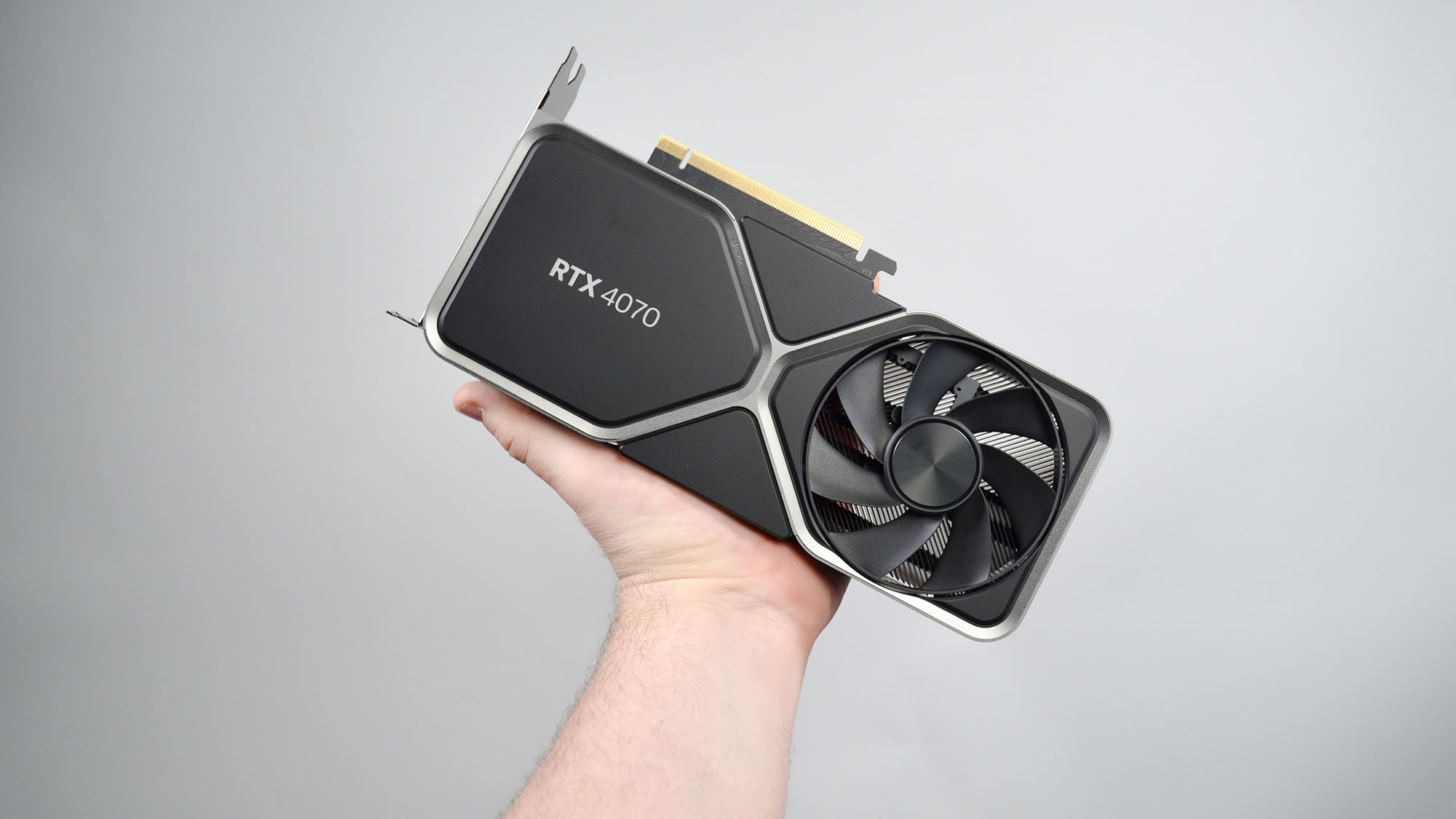
Attributes | Notes | Rating |
|---|---|---|
Value | While 20% more expensive than the card it replaces, its performance more than justifies its price. | 4 / 5 |
Features & chipset | TSMC's 5nm process, mature RT and Tensor cores, and 50% more VRAM than the RTX 3070 add up to a hell of a graphics card. | 5 / 5 |
Design | Like the RTX 4080, but smaller and more manageable, save for the 16-pin power cable that's arguably unnecessary. | 4.5 / 5 |
Performance | Great 4K gaming performance and respectable creative performance as well, all for 200W power draw. | 5 / 5 |
Total | Row 4 - Cell 1 | 4.625 / 5 |
Buy it if...
You want next-gen performance for less than $600
The Nvidia RTX 4070 offers performance on par with the RTX 3080 and even the RTX 3080 Ti for a good deal less.
You don't want a massive GPU
Graphics cards are starting to resemble transformers nowadays (both the autobot and power plant variety), so it's nice to get a graphics card that's just normal-sized.
You want next-gen features like DLSS 3
Nvidia's hardware is often on the bleeding edge of the industry, but things like DLSS 3 and Nvidia Reflex are Nvidia's not-so-secret force multiplier here.
Don't buy it if...
You can get an RTX 3080 cheap
Generally, the RTX 4070 is going to outperform the 3080, but if you don't care about the advanced features and can grab the 3080 in a bargain bin, you could save some money.
You're looking for Nvidia's next budget card
The RTX 4070 is a lot cheaper than the rest of the current-gen graphics card lineups from Nvidia and AMD, but at $600, it's still too expensive to truly be a "budget" GPU.
Nvidia GeForce RTX 4070 review: Also consider
| Header Cell - Column 0 | Nvidia GeForce RTX 4070 | Nvidia GeForce RTX 4070 Ti | AMD Radeon RX 7900 XT |
|---|---|---|---|
Price: | $599 (about £525 / AU$870) | $799 / £799 / AU$1479 | $899 / £899 / AU$1,619 |
Boost Clock | 2,475MHz | 2,610MHz | 2,394MHz |
VRAM | 12GB GDDR6X | 12GB GDDR6X | 20GB GDDR6 |
Memory Bandwidth | 504.2 GB/s | 504.2 GB/s | 800.0 GB/s |
Streaming Multiprocessors | 5,888 | 7,680 | 5,376 |
Ray Tracing Cores | 46 | 60 | 84 |
Tensor Cores | 184 | 240 | N/A |
Connector | 1 x 16-pin | 1 x 16-pin | 2 x 8-pin |
Outputs | 1 x HDMI 2.1, 3 x DisplayPort 1.4b | 1 x HDMI 2.1 3 x DisplayPort 1.4a | 1 x HDMI 2.1a, 2 x DisplayPort 2.1, 1 x USB Type-C |
If our Nvidia GeForce RTX 4070 review has you considering other options, here are two more graphics cards to consider...
AMD Radeon RX 7900 XT
While its bigger sibling gets a lot more attention, don't sleep on the RX 7900 XT. It's one of the best graphics cards AMD has ever produced, and while it's a good bit more expensive than the RTX 4070, it's powerful and future-proofed enough for 8K gaming that you'll be able to get a lot of use out of this card in the long-term.
Read our full AMD Radeon RX 7900 XT review
Nvidia GeForce RTX 4070 Ti
The Nvidia RTX 4070 Ti doesn't have a Founders Edition, so it's going to be more expensive than its $799 MSRP, but the performance on offer here makes this an excellent alternative to the RTX 4070 if you've got some extra cash to spend.
Read our full Nvidia GeForce RTX 4070 Ti review
How I tested the Nvidia GeForce RTX 4070 Ti
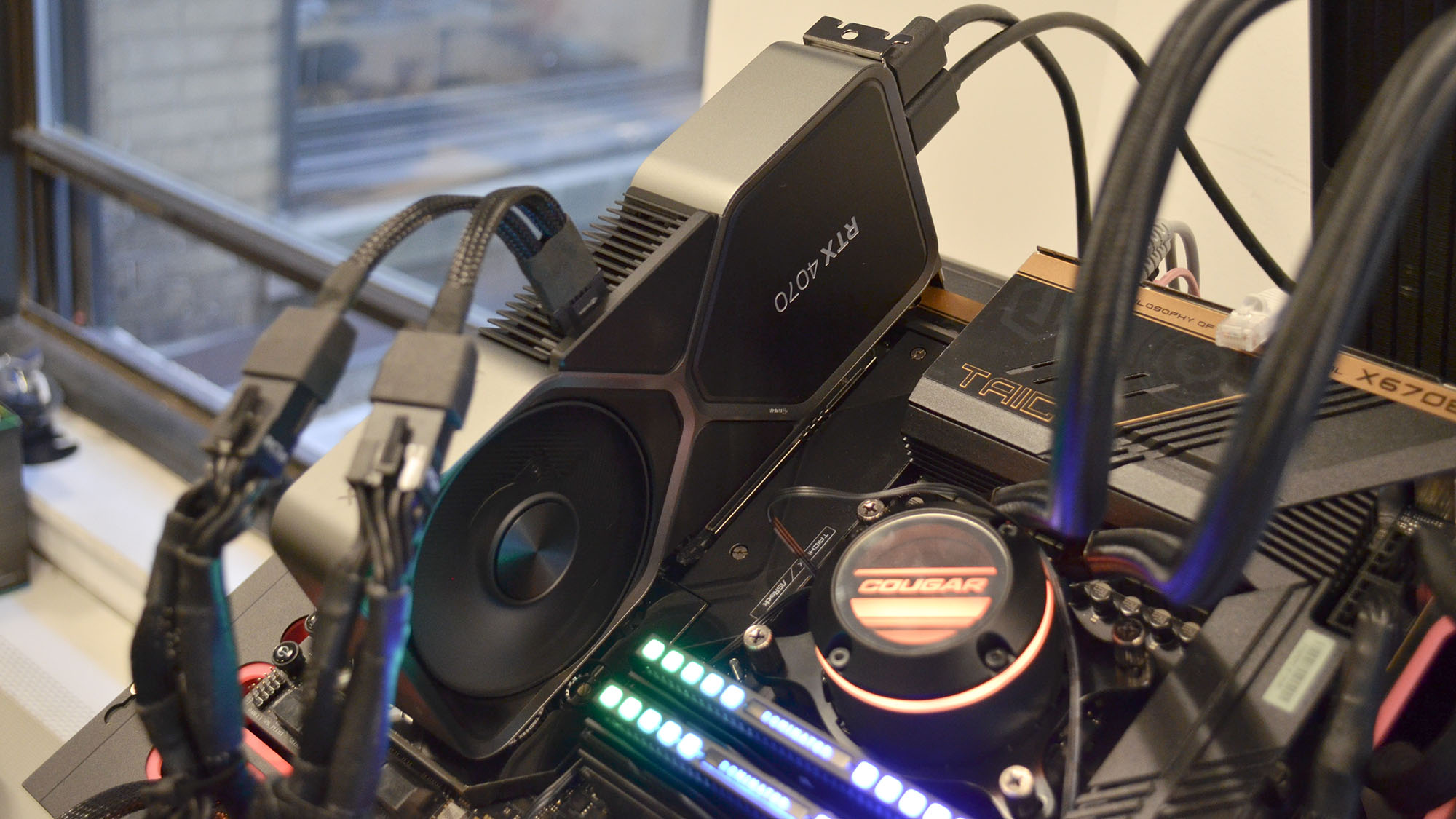
- I spent about 50 hours with the RTX 4070 in total
- Besides general benchmarking, I used the card for everyday gaming and creative work
Here is the systems I used to test the Nvidia GeForce RTX 4070:
CPU: AMD Ryzen 9 7950X3D
CPU Cooler: Cougar Poseidon GT 360 AIO Cooler
DDR5 RAM: 32GB Corsair Dominator Platinum @ 5,200MHz & 32GB G.Skill Trident Z5 Neo @ 5,200MHz
Motherboard: ASRock X670E Taichi
SSD: Samsung 980 Pro SSD @ 1TB
Power Supply: Corsair AX1000 80-Plus Titanium (1000W) Case: Praxis Wetbench
When I test a graphics card, I start by making sure that all tests are performed on the same test bench setup to isolate GPU performance. I then run it through a series of synthetic benchmarking tools like 3DMark as well as in-game benchmarks in the most recent PC games I can access like Cyberpunk 2077 and F1 2022.
I run everything on the maximum settings possible without upscaling tech, and I run all tests at the resolution a reader is most likely to use a given card at. In the case of the RTX 4070, this meant testing at 1080p, 1440p, and 2160p.
I also make sure to install the latest relevant drivers and rerun tests on any competing graphics card that I might have already reviewed and tested, like the RTX 4070 Ti, RX 7900 XT, and RTX 3080 to make sure that I have the most current scores to account for any driver updates. All of these scores are recorded and compared against the card's predecessor, its most direct rival, and the card directly above and below it in the product stack, if those cards are available.
I then average these scores to come to a final overall score and divide that by the card's MSRP to see how much performance every dollar or pound spent actually gets you to find how much value the card actually brings to the table.
Finally, I actually use the card in my own personal computer for several days, playing games, using apps like Adobe Photoshop or Adobe Illustrator, and watching for any anomalies, crashes, glitches, or visual disruptions that may occur during my time with the card. Having extensively covered and tested many graphics cards over the years, I know what a graphics card should do and how it should perform, and can readily identify when something is not performing up to expectations and when it exceeds them.
First reviewed April 2023

John (He/Him) is the Components Editor here at TechRadar and he is also a programmer, gamer, activist, and Brooklyn College alum currently living in Brooklyn, NY.
Named by the CTA as a CES 2020 Media Trailblazer for his science and technology reporting, John specializes in all areas of computer science, including industry news, hardware reviews, PC gaming, as well as general science writing and the social impact of the tech industry.
You can find him online on Bluesky @johnloeffler.bsky.social
You must confirm your public display name before commenting
Please logout and then login again, you will then be prompted to enter your display name.
